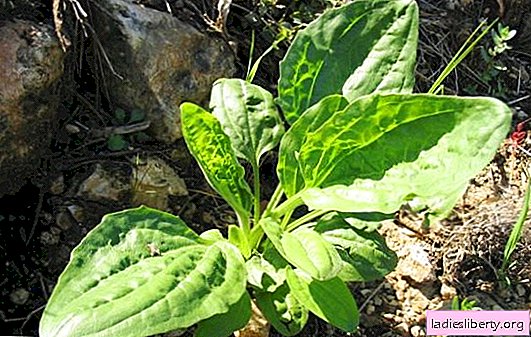
Traditional medicine has always existed and still remains one of the most popular ways to treat their diseases.
Its main difference from classical medicine is the use of natural ingredients. Some adherents of traditional medicine believe that nature itself cures them.
One of the popular plants that is used in the treatment of folk methods is plantain.
What are the beneficial properties of plantain and how is it used?
Useful properties of plantain
Plantain has healing properties. Its leaves are high in carotene, citric acid, enzymes, bitter and tannins, as well as vitamins C and K.
Plantain seeds are rich in oleic acid, saponins and carbohydrates.
Fresh leaves of a young plantain will be an excellent complement to many dishes, for example, salads, omelettes, casseroles, cereals and soups. Very tasty and healthy are cabbage soup from the leaves of this plant. They are prepared in the same way as cabbage soup from nettles.
At different times, scientists conducted numerous phytochemical studies, which led to the conclusion that the components that make up plantain have an effect on cholesterol metabolism. Also, the plant is able to prevent and alleviate pain in patients with peptic ulcer of the stomach and duodenum.
The extract based on the leaves of plantain, depending on the basis (water or alcohol), is able to alleviate the condition even with severe forms of stomach ulcers. Leaves, freshly squeezed juice and other medications with plantain in the composition help to cope with E. coli and staphylococci.
Useful properties of plantain and its use
Fresh and well-washed leaves of this plant are used to relieve pain after insect bites, injuries, bruises and burns. Plantain is also an excellent hemostatic and anti-inflammatory agent.
From the leaves of plantain make an infusion, which is used as an expectorant. Thus, bronchial asthma, pulmonary tuberculosis and whooping cough are treated.
Freshly squeezed juice of plantain leaves is used to treat gastritis, gastric ulcer (and during exacerbations) and the duodenum.
The infusion of fresh leaves of plantain on the water perfectly cleans and heals wounds, cuts, skin rashes (including ulcers).
In folk medicine, plantain is widely used. It is used as:
• Diuretic and diaphoretic;
• pain medication;
• anti-inflammatory;
• sedative.
Plantain also fights tumors of various origins and kills microbes in the body.
To stop bleeding from the wound, crushed leaves of the plant are used.
Based on numerous studies, scientists have concluded that grass is useful for treating infertility in women. However, with one caveat - if this infertility is caused by impaired ovarian function. Plantain treatment gives good results with uterine bleeding.
Plantain is equally good for both internal and external treatment. Plantain lotions help heal wounds, bruises, cuts and burns faster.
Useful properties of plantain, its juice and syrup
Freshly squeezed plantain juice is used as an aid during the treatment of corneal wounds. Its antiseptic properties contribute to the suppression of purulent-inflammatory processes. The juice is used internally to alleviate the condition of ulcers, colitis, gastritis and enterocolitis. In this case, the juice is taken orally by a tablespoon, 3 times a day 20 minutes before meals. The duration of treatment depends on the condition of the patient. By the way, the medicinal juice of plantain can be harvested for future use, if mixed with vodka in equal proportions.
Plantain juice is made from the leaves of the upper part of the large plantain. It is able to relieve inflammation of the colon and gastric mucosa (with low acidity). The form of administration is similar to that described above. The duration of admission in these cases will be at least 30 days, regardless of how soon the pain has passed.
Plantain syrup is an equally popular form of medicine in folk medicine. He copes with colds and viral diseases, the risk of which increases with the onset of cold weather.
For the preparation of syrup, fresh leaves and plantain shoots are used.
There are two recipes for making syrup.
Recipe 1. The leaves and shoots of a plantain are crushed and laid out in layers in a bowl for harvesting. Each layer is sprinkled with a layer of sugar. The workpiece is tightly closed with a lid and stored for 2 months in a refrigerator or a cool dark room. After 2 months, the syrup is ready for use. With its help, treat colds and viral diseases in adults and children.
Recipe 2. Shredded leaves and shoots (about 3 tablespoons) are mixed with sugar or honey in a 1: 1 ratio. The mixture is laid out in a tightly closed dish and sent to heat on a stove. Once the mixture has warmed, it is removed from the stove and allowed to cool. This syrup does not only treat colds. It can be used to relieve symptoms of ulcers and other gastrointestinal diseases. Form of administration: at least 4 times a day 20 minutes before a meal. The duration of treatment depends on the patient's condition.
Useful properties of plantain: decoction, infusion, tincture
Plantain broth
Decoction of the plant treats diseases of the gastrointestinal tract, respiratory diseases and regular cough. Preparing a decoction is very simple. To do this, pour a glass of boiling water 2 tbsp. large plantain leaves, cover and send to heat in a water bath. After half an hour, the broth is removed, allowed to cool, filtered.
A glass of broth is divided into 3-4 doses per day. Each part is drunk 15 minutes before a meal.
If a child or adult is bothered by a dry paroxysmal cough, then a decoction from plantain and other medicinal herbs will help. For example, you will need:
• plantain leaves - 3 tablespoons;
• leaves of coltsfoot - 3 tablespoons;
• pine buds - 3 tbsp;
• warm water - 300 ml.
The broth is prepared as follows:
Plants are mixed, filled with water, sent to the fire.
The broth is removed from the fire after 10 minutes of boiling.
It is insisted for an hour in a dark place, after which the broth is ready for use.
Take medicinal fluid in the morning and before bedtime, 100 ml.
Plantain infusion
The infusion of the plant has an expectorant effect. Due to this property, the infusion of this plant fights against diseases such as bronchitis and asthma, tuberculosis and whooping cough. Infusion of plantain leaves based on water has a healing effect and is used to treat wounds, abscesses, skin ulcers and boils. Infusion of vodka relieves the pronounced symptoms of diseases of the gastrointestinal tract.
An infusion is prepared from the bottom of the plant. For cooking, you need 4 tbsp. crushed raw materials pour 500 ml of warm water. The composition is infused for at least 2 hours, then filtered and ready for use. Accepted infusion of 2 tbsp. 3 times a day before meals.
Plantain tincture
Tincture is no less healing than decoction, juice or syrup. This dosage form of plantain is distinguished by the duration of storage, due to the content of alcohol or vodka in its composition. Tincture also treats diseases of the stomach and intestines.
For tincture you will need:
• 200 ml of freshly squeezed plantain juice;
• 200 ml of vodka.
How to make tincture:
The juice of the plant is mixed with vodka, removed in a cool dark place for 2 weeks.
After this, the tincture is filtered and ready for use.
Tincture is taken once a day. The amount of medicine is calculated by the formula: 3 ml of tincture for every 10 kg of patient weight. The course of treatment should be at least 4 weeks.
Useful properties of plantain and contraindications
Despite the enormous benefits for human health, plantain and its dosage forms may be contraindicated in certain diseases. For example, despite the fact that plantain treat ulcers of the stomach and intestines, with some types of this disease, plantain is strictly prohibited. Therefore, before starting an independent treatment, it is necessary to consult with your doctor.
Long-term treatment with plantain can cause thrombosis.
That is why plantain is not recommended for people with increased blood clotting and in the presence of blood clots.
Plantain is an allergen plant, so asthmatics and allergy sufferers should very carefully begin to take a medicine based on plantain. This should be done in very small doses, with breaks in a couple of days.











